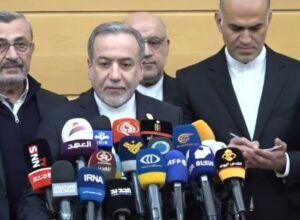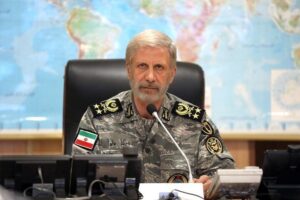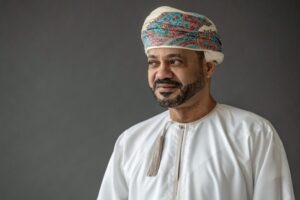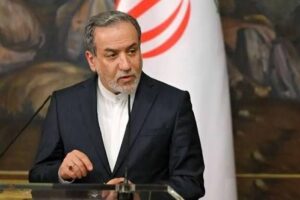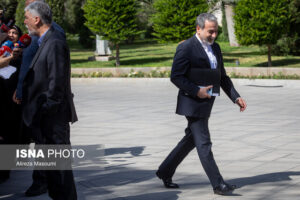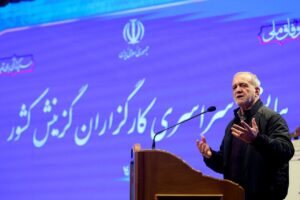In an interview with Al-Monitor, responding to the question, “Does Iran seek peace and integration into regional convergence, and what are Iran’s views and conditions for a long-term peace agreement?” Iravani stated: “The Islamic Republic of Iran has always sought peaceful solutions to address potential concerns about its nuclear program. The conclusion of the JCPOA was precisely based on this approach, and we remain committed to those principles. The fundamental point is the recognition of Iran’s rights as a responsible member of the Nuclear Non-Proliferation Treaty (NPT). We neither seek more than the rights of other members nor less. Under the NPT, every member state has the right to research, produce, and use nuclear energy for peaceful purposes. We intend to exercise all three aspects of this right, particularly the right to domestic production.”
He continued: “Iran insists on maintaining its production capabilities within its territory and under its sovereignty. This does not mean a lack of willingness to cooperate with other countries. We are prepared to collaborate with all regional countries that possess nuclear reactors in areas such as safety and reactor fuel. A regional consortium could be one framework for this cooperation, but I must emphasize that a consortium cannot replace Iran’s national nuclear program; it can only complement it.”
In response to the question, “Is Iran willing to compromise with the United States on enrichment, and would it agree to a regional consortium for enrichment instead of its domestic program?” Iravani asserted: “Iran remains steadfast in its position that enrichment must take place within the country. As I mentioned, a consortium may serve as a complement but will never replace our domestic program.”
When asked, “Is Iran only open to enrichment within a regional consortium framework on its own soil?” he replied: “In principle, we are not opposed to such an arrangement, but the details of any proposed plan must be examined.”
On the question, “Is Iran prepared to place its highly enriched uranium in an escrow account managed jointly by regional countries as part of an agreement?” Iravani stated: “If an agreement is reached—as was the case with the JCPOA when Iran had 20% enriched uranium, which we transferred to Russia in exchange for yellowcake—we are prepared, under a new agreement, to transfer our 60% and 20% enriched uranium stockpiles to another country and remove them from Iran’s territory. These stockpiles could also remain in Iran under IAEA seals. This depends on the nature of the negotiations and the terms of the agreement; therefore, this issue is not a red line for us. If an agreement is reached, it can be resolved.”
Regarding the Iranian parliament’s decision to suspend cooperation with the IAEA, Iravani said: “The parliament has passed this law, and the government is obligated to implement it. This does not mean Iran’s withdrawal from the NPT, but rather a suspension of cooperation with the IAEA. The reason is the IAEA’s failure to fulfill its obligations toward Iran. We are sending a clear message: if the IAEA does not fulfill its duties, Iran cannot be expected to unilaterally adhere to its commitments. If the IAEA acts impartially—condemns the U.S. and Israeli attacks on Iran’s nuclear facilities, refers the issue to the Security Council, and ensures Iran’s rights under the NPT—we are ready to reconsider resuming cooperation in accordance with the same law.”
In response to the question, “If a peace agreement is reached, is Iran open to U.S. and Western investment in its energy sector?” Iravani noted: “Yes, if an agreement is reached, we will not impose any restrictions on U.S. or Western countries investing in our energy sector. However, if the goal is to use such investments as a bargaining chip to halt Iran’s enrichment, such a proposal is unacceptable.”
Finally, when asked, “Is Iran willing to accept restrictions on its ballistic missile program as part of a peace agreement?” Iravani declared: “Iran will not accept any restrictions on its missile activities. The recent aggressions demonstrated that if Iran lacked military capabilities, the other side would never have sought a ceasefire. One reason why a ceasefire has not been implemented in Gaza or secured in Lebanon is that the deterrence capabilities of resistance groups have not reached a level that significantly pressures or makes the Zionist regime vulnerable. However, Iran’s decisive military response inflicted serious damage on the regime’s social, political, and economic sectors. The U.S. president recently acknowledged that the damage to Israel was so severe that it was a key factor in the regime’s request to the U.S. for an expedited ceasefire. Therefore, Iran will never abandon this effective strategic tool or disarm itself against potential future attacks.”

